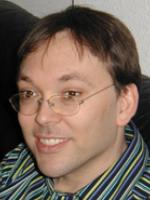
Career
- 1997-2000 Wellcome Trust Fellow in Mathematical Biology, Edinburgh
- 2000-2001 Lecturer, School of Informatics, Edinburgh
- 2001-2004 Wellcome Trust Travelling Fellowship, St Louis and Edinburgh
- 2004-2006 Lecturer, DAMTP
- 2006-2015 Senior Lecturer, DAMTP
- 2015- Reader. DAMTP
Research
Stephen Eglen is a computational neuroscientist: he uses computational methods to study the development of the nervous system, using mostly the retina and other parts of the visual pathway as a model system. He is particularly interested in questions of structural and functional development:
Structural development: how do retinal neurons acquire their positional information within a circuit?
Functional development: what are the mechanisms by which neurons make contact with each other, to perform functioning circuits?
Selected Publications
Please see my publications page
Publications
Mecp2 deficiency impairs microscale cortical network topology and dynamics in a Rett syndrome mouse model
– bioRxiv
(2025)
(doi: 10.64898/2025.12.17.694950)
Homophilic wiring principles underpin neuronal network topology in vitro.
– Elife
(2025)
14,
e85300
(doi: 10.7554/elife.85300)
MEA-NAP compares microscale functional connectivity, topology, and network dynamics in organoid or monolayer neuronal cultures
(2024)
(doi: 10.1101/2024.02.05.578738)
Bayesian model selection for multilevel models using integrated likelihoods
– Plos One
(2023)
18,
e0280046
(doi: 10.1371/journal.pone.0280046)
Bayesian model selection for multilevel models using integrated
likelihoods
(2022)
(doi: 10.48550/arxiv.2207.02144)
Sepsis-3 criteria in AmsterdamUMCdb: open-source code implementation.
– Gigabyte
(2022)
2022,
1
(doi: 10.46471/gigabyte.45)
Analysis of Activity Dependent Development of Topographic Maps in Neural Field Theory with Short Time Scale Dependent Plasticity
– Mathematical Neuroscience and Applications
(2022)
2,
8390
(doi: 10.46298/mna.8390)
Homophilic wiring principles underpin neuronal network topologyin vitro
(2022)
(doi: 10.1101/2022.03.09.483605)
Causality indices for bivariate time series data: a comparative review of performance
– Chaos: an interdisciplinary journal of nonlinear science
(2021)
31,
083111
(doi: 10.1063/5.0053519)
- 1 of 12
